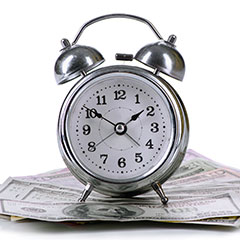Timing is Everything: How to Handle Subsequent Events in Valuation
November 17, 2015 | Court Rulings, IRS Regulation, Tax Planning, Valuations
 Business valuations are prepared as of a specific date, similar to balance sheets. Sometimes a valuation’s effective date is in the past, and events have occurred after the valuation date that would have impacted the company’s value if investors knew (or could have known) about them beforehand. These retrospective valuations are common in litigation and tax matters. It might be tempting to use hindsight when preparing retrospective valuations, but appraisers must tread lightly when it comes to considering subsequent events in valuation.
Business valuations are prepared as of a specific date, similar to balance sheets. Sometimes a valuation’s effective date is in the past, and events have occurred after the valuation date that would have impacted the company’s value if investors knew (or could have known) about them beforehand. These retrospective valuations are common in litigation and tax matters. It might be tempting to use hindsight when preparing retrospective valuations, but appraisers must tread lightly when it comes to considering subsequent events in valuation.
Business valuations prepared for tax and litigation purposes generally use “fair market value” as the appropriate standard of value. IRS Revenue Ruling 59-60 defines fair market value as:
“The price at which the property would change hands between a willing buyer and a willing seller when the former is not under any compulsion to buy and the latter is not under any compulsion to sell, both parties having reasonable knowledge of relevant facts.”
Unless the information was available on (or before) the valuation date, the following provision suggests that subsequent events should not be factored into fair market value estimates. IRS Revenue Ruling 59-60 also states, “Valuation of securities is, in essence, a prophesy as to the future and must be based on facts available at the required date of appraisal.”
Guidance under Professional Standards
Both the Uniform Standards of Professional Appraisal Practice (USPAP) and the American Institute of Certified Public Accountant’s Statement on Standards for Valuation Services (VS) Section 100, provide guidance on the treatment of subsequent events, but the guidance differs somewhat. USPAP says, “Data subsequent to the effective date may be considered in developing a retrospective value as a confirmation of trends that would reasonably be considered by a buyer or seller as of that date.”
On the other hand, VS Section 100 says, “Generally the valuation analyst should consider only circumstances existing at the valuation date and events occurring up to the valuation date. An event that could affect the value may occur subsequent to the valuation date; such an occurrence is referred to as a subsequent event. Subsequent events are indicative of conditions that were not known or knowable at the valuation date, including conditions that arose subsequent to the valuation date.”
USPAP provides for consideration of subsequent sales as a confirmation of the date of value conclusion, but neither USPAP nor VS Section 100 specifically address a subsequent sale of the business or an interest in the business. However, VS Section 100 specifically notes that only information known or knowable as of the valuation date should be considered.
In litigation involving retrospective valuations, the differences between subsequent events guidance provided under USPAP and VS Section 100 could cause differing conclusions of value. As is sometimes the case, USPAP’s position is somewhat vague. It implies that subsequent information can be used to determine a value at an earlier date, but at the same time says it’s to be used only as confirmation of “trends.”
Tax Court Precedent
The Tax Court has noted that certain subsequent events that occur within a reasonable time after the valuation date may be appropriate to consider in valuation cases. When valuing a business for tax purposes, it’s important to note that the IRS and the U.S. Tax Court have historically considered subsequent events in valuations, especially subsequent sales of a subject business or business interest.
For example, in Ringgold Telephone Company v. Commissioner (T.C. Memo 2010-103), the court considered a subsequent sale of the subject business interest. In accordance with the ruling in Ringgold, the following events might be fair game:
- Subsequent events that were reasonably foreseeable by a hypothetical buyer or seller as of the valuation date;
- Subsequent events that prove the reasonableness of expectations of a hypothetical buyer or seller as of the valuation date;
- The subsequent sale of the subject ownership interest; and
- The subsequent sale of comparable ownership interests.
Interestingly, in Ringgold, the Tax Court didn’t apply the “reasonably foreseeable” criterion to a subsequent sale, but only the existence of such a sale. In this case, the sale took place approximately six months after the valuation date, which the Tax Court considered to be within a reasonable period for consideration.
Be Ready to Disclose and Defend
Like many other gray areas that arise in valuation, the best answer is for the valuation analyst to disclose and discuss in the report how the issues have been resolved and be prepared to defend his or her position. When preparing retrospective valuations, appraisers may disagree about whether or not to consider subsequent events. Contact Filler & Associates for assistance on handling subsequent events in valuations.
